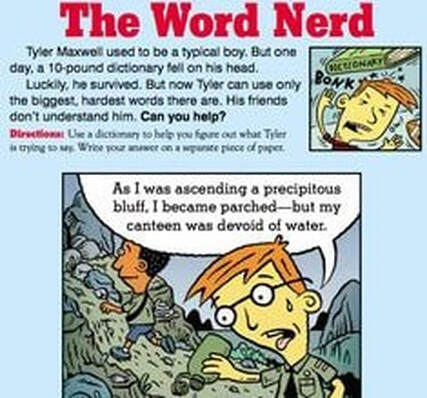9 January: Word Nerd Day
 Nerd
NerdHave you ever read or has someone ever read to you the now somewhat controversial book by Dr Seuss, If I Ran the Zoo? You may remember these lines…
“And then, just to show them, I’ll sail to Ka-Troo
And bring back an it-kutch, a preep, and a proo,
A nerkie, a nerd, and a seersucker too!”
The book, published in 1950, is credited with being the first use of the word nerd in print. Around this time, nerd was also an American student slang term said to be related to the slang term nert (stupid or crazy person).
Nert, in turn, is attested from 1903 and may be an alteration of another slang term, ‘nut’. For example, nuts or nutty is often used to describe something crazy. Nut-house (an insane asylum) is from 1929. Nut-case meaning a crazy person is from 1959; the British use the term nutter. Nuts can also mean nonsense.
The first use of the word nuts to mean crazy or not right in the head is from 1846. However, interestingly, nuts meaning ‘to be very fond of’ is from 1785 and meaning ‘any source of pleasure or delight’ is from the 1610s. Perhaps people can seem crazy when they are very fond of someone or something (The word fond is also one of the sources of the word fun; but that’s another story).
In current usage, a nerd is usually a student who is seen as socially inept or slavishly devoted to intellectual or academic pursuits (heaven forbid!).
Word
A word to the wise as we begin: the following item on the origins of the word word describes various words for word. So, in a word, when I write the word word I am not stumbling over my tongue although I may seem a bit wordy. You have my word for it.
So, here we go. The English word word has its origins in PIE wer, were, werdh (to say, to speak). In the beginning, a word was an action rather than a thing.
From PIE wer emerges Proto-Germanic wurdan (the source of Old Saxon and Old Frisian word, Dutch woord, Old High German and German wort, Old Norse oro, and Gothic waurd), and the Old English word word (speech, talk, utterance, statement, news, report, word). The word word came to Old English from these origins with two meanings: first, speech, talk, utterance, report; and, second, a promise (e.g., she kept her word). In oral cultures, before literacy was common, 'to keep your word' was as important to social cohesion as later signed legal documents.
Reference: Online Etymological Dictionary, https://www.etymonline.com/
Published on January 09, 2022 08:32
No comments have been added yet.



